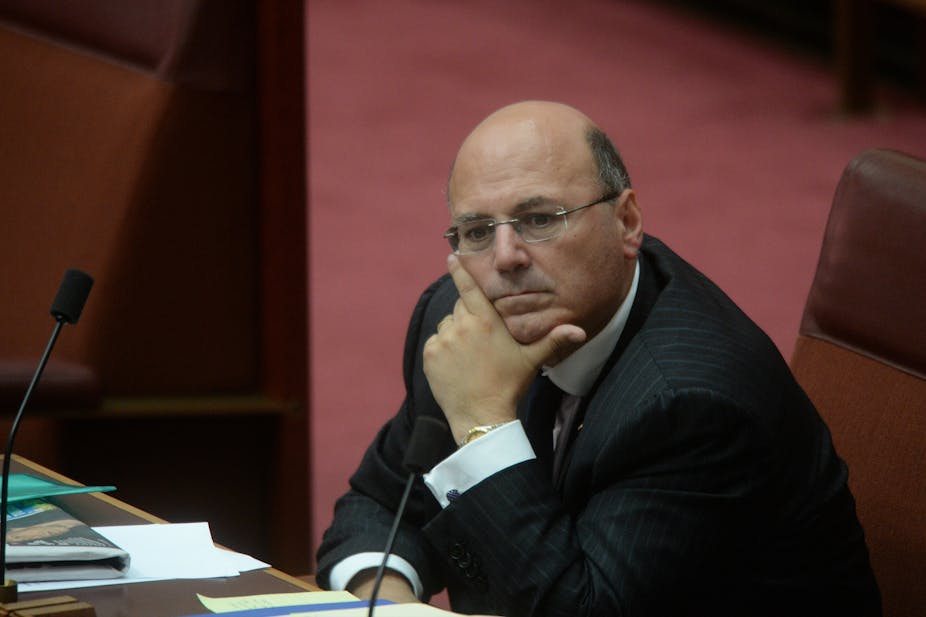It’s hard not to be disturbed by the allegations emerging from the inquiry into Australian Water Holdings (AWH) by New South Wales’ Independent Commission Against Corruption (ICAC). The proceedings have painted a picture of NSW politics as increasingly tainted by corruption and extensive networks of money and influence. These networks run from unions and companies (both public and private) to parties, parliaments and ministries.
As the latest high-profile politician to take the stand, the allegations against Liberal Party senator Arthur Sinodinos have revealed yet another series of potentially damaging relationships and financial transactions. Among these are suggestions that during Sinodinos’ time on the AWH board, A$76,000 was donated to the Liberal Party and billed back to Sydney Water under the guise of providing water and sewage infrastructure in northwest Sydney.
At the time, Sinodinos also held the position of honorary treasurer of the NSW Liberal Party.
The allegations against Sinodinos hang on the extent of his knowledge and involvement in the allegedly corrupt dealings of AWH. However, the inquiry has also highlighted a much broader problem that potentially threatens political integrity. Conflicts of interest arise when party officials also hold senior positions on companies that have a financial interest in government contracts, or companies that could potentially benefit from political connections.
When parliamentarians enter public office they are required to disclose their financial interests in the hope that transparency might build a solid foundation of parliamentary ethics. This guards against conflicts of interest and minimises the risk of corrupt behaviour. In some states, declarations also extend to MPs’ families and their spouses.
Typically, parliamentarians self-regulate. Registers and codes of conduct are designed to influence behaviour in line with public expectations and ethical practices, but they do not have legislative force. A breach, therefore, may be of little consequence.
Parties offer back-door access to power
The public duty of parliamentarians and ministers is at least reasonably clear. What is far murkier is where political parties and their high-ranking officials are placed within these networks of influence. Some party positions yield considerable strategic and financial power. However, whose interests officials serve is not always clear.
It is common for party presidents, directors, treasurers and secretaries to also hold office within companies, unions and interest groups. In itself, this is not necessarily a bad thing. Such overlaps between party members (office holders or ordinary members) and outside groups are an important way in which parties maintain connections with their support base. They may even help to generate policy ideas.
For the Liberals, this membership overlap would traditionally include business organisations. For Labor, it is unions. After all, political parties are the parliamentary voice of organised interests.

As the ICAC inquiry has shown, the values underpinning our democracy are threatened when influence can be bought through political parties without having to comply with the guidelines that regulate direct access to governments.
Political integrity can be threatened by donations to parties or payments for access to politicians at party fundraisers. Disclosure laws catch these donations, but thresholds are high, reporting mechanisms are clunky and disclosures lags well behind expenditure.
Laws cannot address the influence exercised by party officials when they act as “middlemen”. This is particularly a problem when no payment is involved.
What is not regulated – and rarely acknowledged – is the culture of fundraising within the major parties and the norms governing these practices.
As private, voluntary associations, political parties are generally not required by legislation to reveal the interests of their senior office bearers. Nor is there a culture of party members demanding transparency in these matters. The Greens, with an internal policy on donations, stand out as an exception.
For many parties the desire to win elections trumps other concerns. And to win parties need to raise money and keep supporters and donors onside. This is what drives party politics in Australia.
Who calls parties to account?
Because parties and politicians are so intimately related, we tend to think that parties are quasi-public bodies. Parties support their candidates’ campaigns and we vote for parties rather than individuals at the ballot box. At the very least, we believe they play at least some sort of a public function.
Since the establishment of public funding in Australia the law has also been moving in this direction, but not far enough to allow any sort of legislative intrusion to regulate potential conflicts of interests within political parties.
Achieving reform in this area is not straightforward. Legitimate disagreements exist over the public duty of parties and their role as campaigning organisations designed to further the interests of their members and supporters (which includes donors). Whose interests a party should serve is a debate that has existed since parties themselves.
The more immediate question here is whose interests should party office holders serve: those of their party or their company? If we want to see greater transparency and more ethical practices established, agitation for change needs to come from within the parties. This needs to be driven by the membership, which in a voluntary association is the only real source of accountability.

